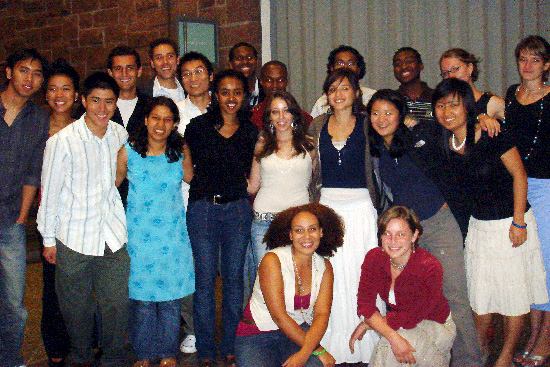Residential Life Staff Honored by National Organization
 |
| Residential Life student-staff members for the Butterfields and 156 High Street and 200 Church Street are among those trained by Residential Life’s award-winning Social Justice Training Program. |
| Posted 11/17/06 |
| A program developed by Wesleyans Residential Life received the Program of the Year Award from the National Association of Student Personnel Administrators (NASPA), based in Washington DC.
The Social Justice Training Program, spearheaded by Residential Lifes area coordinators, teaches and trains about 100 student-staff members on the topics of social justice, the cycle of socialization, dominant and subordinate group dynamics, privilege and power and the action continuum. It also stresses liberation from systems of oppression, through exploring specific forms of oppression, including racism, sexuality and gender systems of oppression, class and religious oppression. Fran Koerting, director of Residential Life, nominated the program for the NASPA award. By participating in the program, our student-staff is able to apply the knowledge they learned in creating inclusive communities within their residential area, how to interrupt and confront instances of oppression and how to respond to hate and bias incidents, Koerting says. The Program of the Year award is awarded to programs that have been implemented within the three previous years. Programs were evaluated on innovation and creativity, contribution to student development and/or professional development, contribution to the home institution and timeliness of topic. Program planning began in June 2006, with input from student leaders and colleagues from other departments, as well as the Residential Life central staff and student staff members. During the two-hour sessions held on five consecutive days during August training, students had the opportunity to listen, discuss and reflect as well as participate in various activities. In-services are being held throughout the year. The trainers taught the student-leaders how to appreciate different cultures and lifestyles; understand how social justice relates to the job; how to feel comfortable facilitating conversations; being aware of social justice resources, and knowing the protocol for bias and hate incidents. Not only did the program have a significant impact on the student staff, but it also affected the area coordinators who had developed it, Dawn Brown, Sharise Brown, Brandon Buehring, Eric Heng and Robin Hershkowitz. All five of us have had significant experience as professionals in Residential Life for at least three years, yet we found the experience of developing and collaborating as well as conducting the training contributed a new and exciting opportunity,” explains Hershkowitz, the area coordinator of Nicolson, Hewitt and Fauver Residence halls. “Not only were we excited that we were able to conduct these trainings with our students, but the experience contributed greatly to our personal and professional growth.” The university is considering adapting the Residential Life Social Justice Training Program for use with faculty and staff. As for the Wesleyan community, social justice is one of the most important issues for students and staff alike, Koerting says. Instituting a year long focus, and providing student staff with the information and tools to address the issues with their residents, makes it possible to have a significant impact on the entire community. The area coordinators have also shared the program with their colleagues in the field through a session at the Northeast Association of College and University Housing Officers New Professionals Program on Oct. 20. In addition, they will present a session on the program during the annual NASPA/Association of College Personnel Administrators conference in Florida in March. The NASPA, headquartered in Washington DC, is the leading voice for student affairs administration, policy and practice and affirms the commitment of student affairs to educating the whole student and integrating student life and learning. With over 11,000 members at 1,200 campuses, and representing 29 countries, NASPA members are committed to serving college students by embracing the core values of diversity, learning, integrity, service, fellowship and the spirit of inquiry. |
| By Olivia Drake, The Wesleyan Connection editor |

